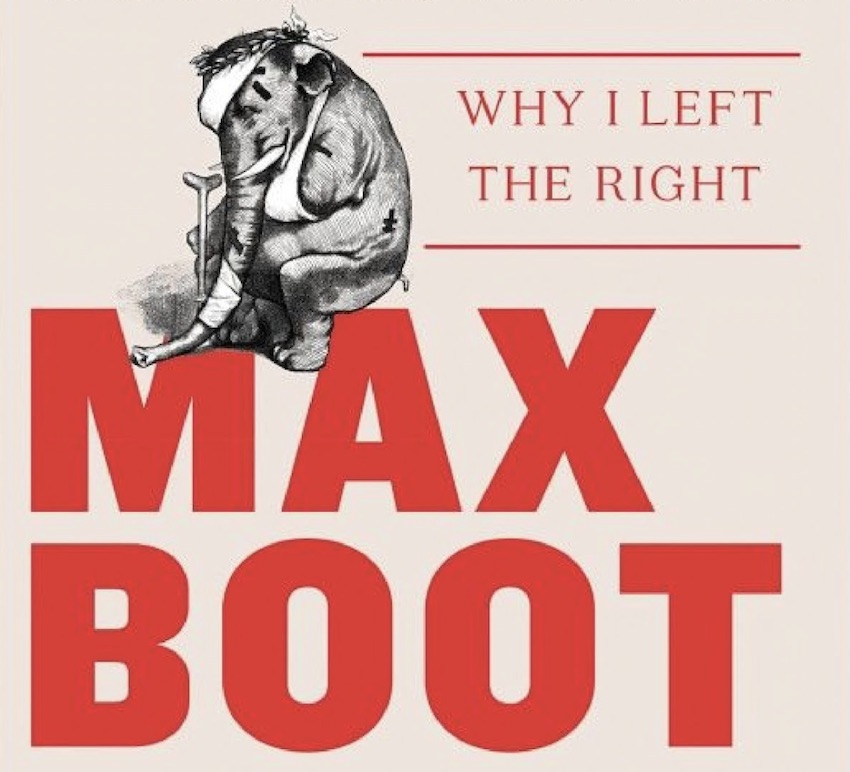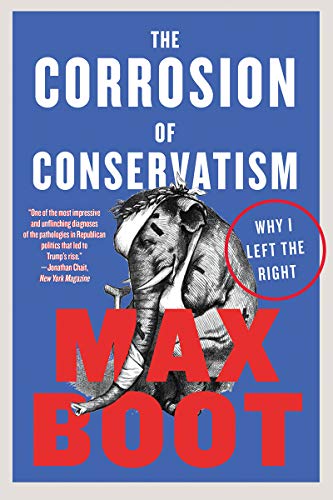Denouncing the Republican Party
"My ideology has come into contact with reality," conservative Max Boot writes in his new book, "and reality is winning." Liveright Publishing
Liveright Publishing
“The Corrosion of Conservatism: Why I Left the Right”
By Max Boot
Max Boot begins “The Corrosion of Conservatism: Why I Left the Right” with an inscription from W.H. Auden’s “September 1, 1939”:
“All I have is a voice
To undo the folded lie,
The romantic lie in the brain
Of the sensual man-in-the-street
And the lie of Authority
Whose buildings grope the sky.”
I’d call this chillingly prescient. But thanks to The New York Times, we now know that Donald Trump didn’t actually build any of those sky-groping buildings. No matter. Max Boot has Trump’s measure: The Donald is “a bigoted bully” with few convictions “outside of narcissism and nativism, racism, and sexism.” “His entire career has been full of racist slurs and acts.” He’s a “functional illiterate,” “a plutocrat who avoided the draft and has never shown any willingness to sacrifice anything for anyone.” And Boot quotes an anonymous Republican congressman: Trump is “an evil, really fucking stupid Forrest Gump.”
“It strains credulity to claim,” Boot adds, “as Trump supporters do, that there was no relation between the Kremlin’s intervention and Trump’s victory.”
If “The Corrosion of Conservatism” had come out a couple of months earlier, Boot would have probably received a pipe bomb in the mail.
Click here to read long excerpts from “The Corrosion of Conservatism” at Google Books.
Boot, to borrow a phrase from Henry James, has not lost his temper but found it. A columnist for The Washington Post, a global affairs analyst for CNN, a former WSJ editorial page editor and the author of several excellent books—most recently “The Road Not Taken: Edward Lansdale and the American Tragedy in Vietnam“—Boot has written the essential book of the Trump era, the one that needs to be read immediately by those of all political stripes.
One of the things that makes “The Corrosion of Conservatism” powerful reading is that Boot, while refusing to identify himself as a Democrat—he is still a fiscal conservative, pro-free market and the welfare state, pro-free trade, pro-environment, and pro-gun control—has shed all illusions of his own party. The recent history of the Republican Party is “the story of moderates being driven out and conservatives taking over—and then of those conservatives, in turn, being ousted by those even farther to the right.”
He rejects “the premise, so popular in conservative circles, that the white identity politics promoted by Trump is simply an understandable response to the identity politics of African Americans, Latinos, Asians and other minorities.” Seen in the context of the long sweep of history, these politics are “a reaction to, rather than the cause of, white-nationalist sentiment.”
This isn’t news to many people, he admits—“But it is a new realization for me.”
In a paragraph that deserves to be reprinted on the internet and quoted on television, he writes, “No, not all Trump supporters are racist. But virtually all racists, it seems, are Trump supporters. And all Trump supporters implicitly condone his blatant prejudice. At the very least they don’t consider racism to be a reason to turn against the president. For a disturbingly large number of Trump voters, it is the primary reason to support him.”
Boot is likely the most persuasive voice in conservatism. Granted, given the current state of conservative thought, that’s not saying much, which is precisely the point of this book. “The modern conservative movement,” Boot writes, “was inspired by Barry Goldwater’s canonical text from 1960, ‘The Conscience of a Conservative.’ I believed in that movement, and served it my whole life.”
Boot’s views shifted not just because of Trump, but after a review of his original sources. “I used to think that Goldwater’s reputation as an extremist was a liberal libel,” he writes. “Reading his actual words—something I had not done before—reveals that he really was an extremist.” Boot now prefers to see himself as “an Eisenhower Republican,” by which I assume he means a Republican who golfs a lot and doesn’t attack the media, maintains our traditional alliances, and doesn’t envy foreign dictators.
He came by his ideology the hard way. Born in 1969 in Russia—“what Donald Trump would call a ‘shithole’ country”—he grew up in a Soviet Union where prejudice was so pervasive that Jews had their nationality stamped on their passports, “just like in Nazi Germany.” Boot’s father was a refusenik, a dissident who was denied permission to leave the country. His parents and many other Soviet Jews were finally granted permission to immigrate, in large part helped by U.S. conservatives’ hard line against the USSR repression of Jews. (The family made it out of Russia just in time, narrowly escaping a KGB warrant.)
Boot is “thankful to America for taking us in … and I am greatly saddened that the United States has extended refugee status to so few others in the Trump era.” Other kids his age grew up wanting to be cowboys or athletes or astronauts; young Max grew up reading William F. Buckley’s magazine, National Review, and conservative Old Testaments like the economist Friedrich Hayek’s “The Road to Serfdom,” “The Conservative Mind” (a volume edited by Russell Kirk) and Edmund Burke’s “Reflections on the Revolution in France.“ (One quibble that’s always bothered me: Burke was not an “English political philosopher” but an Irish one.)
He dreamed of being a columnist like Buckley and George Will. Buckley’s PBS show, “Firing Line,” “elevated conservatism; the shows that conservatives watch today, primarily on the Fox News Channel, debase and dumb down the movement.” Boot’s political hero “was Ronald Reagan: He made conservatism optimistic and inclusive—a sharp contrast to how dark and divisive the movement would become in recent years.” The U.S. successes in the Cold War during the Reagan years “made me proud to be an American—and a conservative.”
And a brief but incisive insight: “Reagan offered hope; Trump, fear.”
It came as a shock that “Republican voters could not have cared less what elite conservatives like us were saying. Trump went over our heads by speaking directly to the country at his televised rallies.” Boot continues, “It turned out that conservative eggheads were just as far removed from the heartland of America” as the liberals, whom conservatives mocked for being “elite” and “out of touch.”
The worst part, though, was the way Republicans who savaged Trump during the primaries caved when he became the favorite for the nomination. Boot was particularly hurt when Marco Rubio flipped: “I had thought he was a man of principle.” The defection of Ted Cruz did not surprise him, though. The senator from Texas “was every bit as opportunist and unprincipled as Trump—not nearly as successful at faking candor.”
Boot holds nothing back. “Republicans genuflected before their new master,” and demonized their Democratic opponents, particularly, of course, Hillary Clinton. Despite political differences, his decision for the 2016 presidential election was clear. “The strongest case for Clinton is what she is not,” he wrote in Foreign Policy magazine. “She is not racist, sexist … cruel, erratic, or volatile. She is not a bully or an authoritarian personality. She is not ignorant or unhinged.”
Of all the conservative toadies who gave in to Trump, “the fundamentalists were the most egregious; these supposed champions of morality were willing to support a candidate who regarded the sins prescribed in the Ten Commandments as his personal to-do list. The more Commandments he violated, the better they liked him.” Trump’s inaugural address was “the most dystopian, disquieting, and divisive” ever. His vision of America, “paranoid, angry, xenophobic.”
“Under the pressure of Trumpism, conservatism as I understand it has been corroding. … I no longer like to call myself a conservative,” Boot writes. “Other contemporary developments such as the failure of the Iraq invasion, the Great Recession of 2008-2009, the #MeToo movement, and the spread of police video tapes revealing violent racism” played into his decision to renounce the Republican Party.
“My ideology has come into contact with reality,” Boot acknowledges. “And reality is winning.”
Your support matters…
Independent journalism is under threat and overshadowed by heavily funded mainstream media.
You can help level the playing field. Become a member.
Your tax-deductible contribution keeps us digging beneath the headlines to give you thought-provoking, investigative reporting and analysis that unearths what's really happening- without compromise.
Give today to support our courageous, independent journalists.






You need to be a supporter to comment.
There are currently no responses to this article.
Be the first to respond.